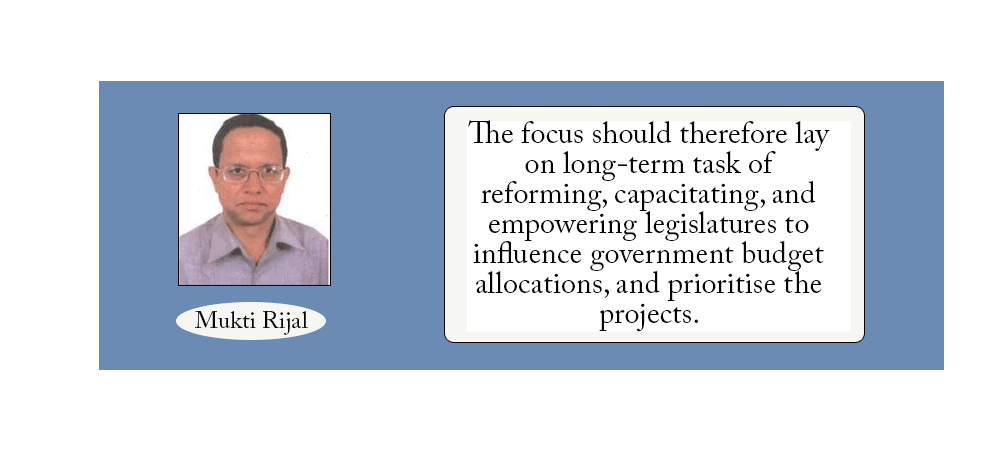- Friday, 20 February 2026
Caveats Of Fund Allocations To MPs
Newly appointed Deputy Prime Minister and Home Minister Narayan Kaji Shrestha took an important step to scrap the decision on the day he assumed the charge of home ministry the other day. The said decision targets to scrap the ad hoc arrangement made over the past several years that has been uninterruptedly invoked for long to draw cash amount from state coffer by interior (home) minister and secretary in mobilising what is described as the intelligence services (Suraki) with a view to keep tab on the suspected anti-state and anti-social activities. This decision is reportedly expected not only to save a sizeable amount of resources at a time when the nation is mired in financial difficulties apart from checking indulgence in an unaccounted for expenses from the public exchequer.
To further and enhance the spirit upheld by Home Minister Shrestha, incumbent Finance Minister Dr Prakash Sharan Mahat is also keenly watched and anticipated to revoke the budgetary allocations towards Parliamentary Constituency Area Development in the upcoming budget that gobbles up huge amount of resources credited to state exchequer every year without any significant results. This article seeks to discuss the flip side of the fund allocations to lawmakers. Needless to say, two core duties of parliamentarians are, indeed, to represent the interests of the electorate in the making of laws and to oversee the work of the executive arm of government. However, in a growing number of countries where Westminster model of parliamentary democracy is more or less instituted, lawmakers are choosing to overlook these duties, and diverting their focus on pork barrel projects to be implemented in their respective constituencies using state appropriated funds.
Role of parliament
In most parliamentary constituencies, the law and constitution prescribe a central role to parliament in taking governmental decisions and overseeing their implementation. However, the parliaments in some of the developing countries are in most cases marginalised even more so when it comes to decisions relating to resources allocations. They do not possess enough resources, skills and capacity to hold executive to account and carry out the minimum oversight functions they are entitled to carry out. It has been argued that the fund allocations can empower parliaments by allowing them to spend money independently of the executive. Lawmakers are also found claiming that such allocations allow them to respond directly to concrete demands from their constituents.
In fact, people have developed certain unscheduled expectations of treating their lawmaker as a provider of financial assistance. This has created problems for those parliamentarians who are unable to respond adequately to such expectations. Lawmakers are also found claiming that such fund allocations help them to ensure project delivery in the face of ineffective local structures. This can also channel funding directly to community to enable the participation of the local population in the choices and carrying out of local infrastructure projects they need. However, fund allocations for constituency area development breach the principle of the separation of powers by conferring parts of the executive function of budget execution on the legislature or lawmakers.
In fact, any outfit that comprises of members of parliament, and is charged with expenditure of public funds is commingling the roles of the different organs of state in a manner that is unacceptable in a multiparty democracy. A report dealing with the constituency development allocations widely practiced in African parliaments where Westminster model prevails says “Constituency development fund represents just another story of African corruption. When one considers evidence from countries with long-standing constituency development allocations, the real risks become clearer. The problem with such allocations is that they corrupt the relationship between MPs and their constituents and between parliament and the executive”.
Similarly, common wealth parliamentary association warned, not very long ago, that fund allocations to lawmakers for pork barrel projects could contribute to shifting the relationship between lawmakers and their constituents from political to financial basis. A study conducted in the Philippines found that because of such fund allocations more and more voters think lawmakers should be evaluated on their ability to bring in benefits to their constituency, not how effectively they make laws and contribute to the legislative deliberations. These examples show that constituency development allocations contribute to clientelism reducing parliamentarians as being what is said as “automatic teller machines,” rather than representatives of the people in the governance process.
Lack of transparency
According to a study conducted in Nepal to audit and evaluate the use of the constituency area development fund, there was no transparency in fund utilisation. As a result, the expenditures could not meet the actual needs and problems of the people. A sizeable amount remained unsettled raising serious issues of fiduciary risk. Moreover, there have been some cases of duplication of resources as the planning process defined in the rules and regulations was not followed properly. Nepal’s federal scheme entrusts local governments important constitutional mandates and competencies to carry out local infrastructure development which overrides and duplicates lawmakers are provided such allocations in the name of constituency development.
The new finance minister should therefore give attention to devising alternative to the prevailing practice of short-term project benefits that provide to lawmakers and some of their constituents. The focus should therefore lay on long-term task of reforming, capacitating, and empowering legislatures to influence government budget allocations, and prioritise the projects that deliver benefits to needy people in the far-off hinterlands of the country. Parliament should also be enabled to hold the executive to account for the implementation of the budget. Such a long term measure may not be attractive in the face of the fast and quick promises of the constituency development allocations. The evidence does, however, suggest that short-term pleasure of such allocations may result in long-term financial pain for the country.
(The author is presently associated with Policy Research Institute (PRI) as a senior research fellow. rijalmukti@gmail.com)















